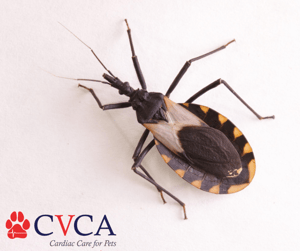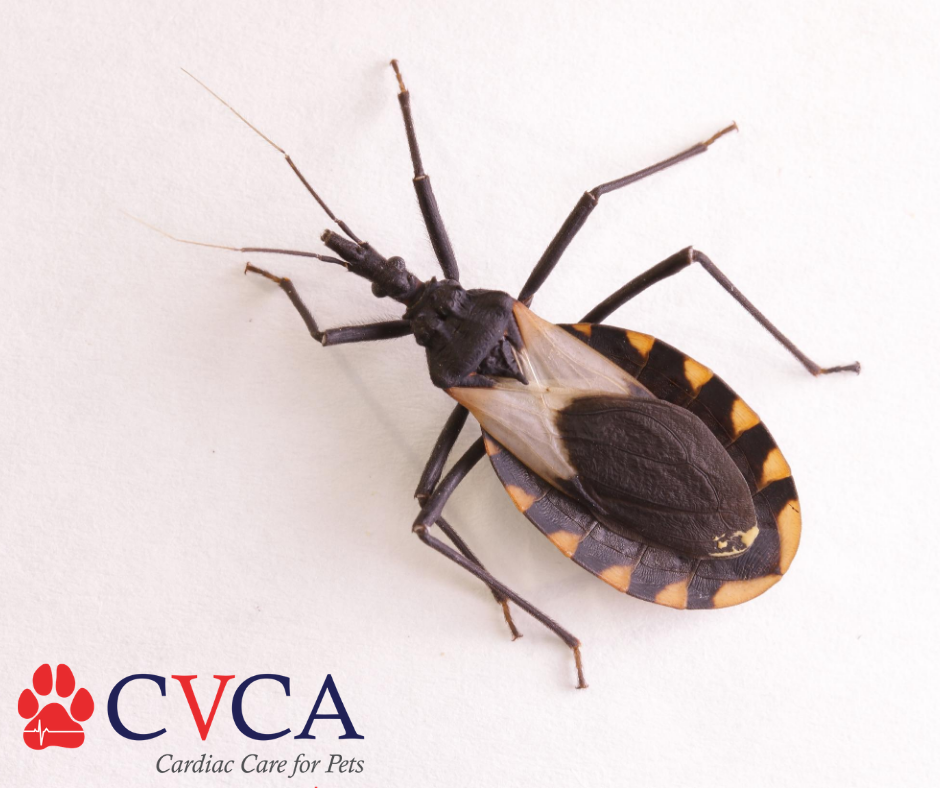Canine Chagas Disease
November 2020
Imagine a plot from a horror story…a few months
after the bite of a seemingly innocent looking bug, your dog develops palpitations, heart muscle weakness and even fluid build-up in the belly. Think this sounds too crazy to be real? Think again. Chagas myocarditis is a parasitic disease that affects dogs in the gulf coast states and adjacent areas. Texas is a hot spot.
What is Chagas disease?
Chagas disease is caused by a parasite called Trypanosoma cruzii. The parasite is carried by a bug in the assassin or kissing bug family (Triatoma spp.)
 Chagas disease is common in humans in Central and South America. Although there are occasional cases reported in people in the US, it is not common. It is, however, relatively common in Texas in dogs, as the family of bugs that transmit the parasite are all over the state.
Chagas disease is common in humans in Central and South America. Although there are occasional cases reported in people in the US, it is not common. It is, however, relatively common in Texas in dogs, as the family of bugs that transmit the parasite are all over the state.
Once the bug bites its victim (or a dog eats the bug), the parasite enters the bloodstream, eventually landing in the muscle of the heart. It infects the heart muscle, usually on the right side. Once there, it can lead to electrical problems (arrhythmias) including heart rates that are too slow, too fast, or both. The parasite also causes inflammation and scarring, leading to poor heart muscle function. Eventually, the heart can no longer pump normally the heart fails and fluid pools in the belly due to- congestive heart failure.
How do I know if my dog has Chagas disease?
Chagas disease is diagnosed with a blood test. Your veterinarian or veterinary cardiologist may recommend this blood test if your dog has an irregular heartbeat, an enlarged heart on an x-ray or echocardiogram, or a heart murmur. Some dogs have no symptoms of Chagas disease for years after initial infection. Other dogs develop weakness, fainting, fluid in the abdomen, and difficulty breathing. Your veterinarian will recommend additional tests, including a heart evaluation and Chagas testing if they suspect Chagas disease.
How is Chagas disease treated?
There is no tried and true treatment for chronic Chagas disease in animals nor humans. Certain drugs not approved by the FDA are used in humans with this disease with variable success outside of the USA. Treatments are based on treating the symptoms of Chagas disease including rhythm problems, poor heart muscle function, and congestive heart failure. Options for treatment include medications, pacemaker implantation, and physical fluid removal (centesis). Prognosis is variable, but for patients with rhythm problems or congestive heart failure, the average survival is about one year.
Is your veterinarian concerned for Chagas disease?
CVCA is here to help pet owners with compassionate care for dogs and cats with heart disease. When your dog presents with signs that might be due to Chagas disease, we are able to consult with you and your primary care veterinarian to develop an effective treatment and monitoring plan.
If you’re looking for the best cardiac care for pets throughout Kentucky, Maryland, Texas, Virginia, and beyond, contact us at CVCA to schedule an appointment today.

